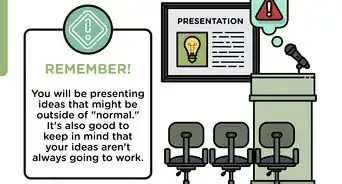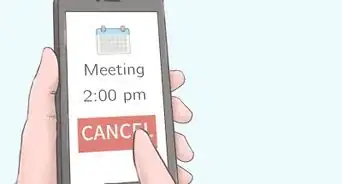This article was co-authored by Asa Don Brown, PhD, DNCCM, FAAETS. Dr. Asa Don Brown is a Clinical Psychologist with over 25 years of experience. He specializes in working with families, children, and couples, treating a variety of psychological disorders, trauma, and abuse. Dr. Brown has specialized in negotiation and profiling. He is also a prolific author having published three books and numerous articles in magazines, journals, and popular publications. Dr. Brown earned a BS in Theology and Religion with a minor in Marketing and an MS in Counseling with a specialization in Marriage and Family from The University of Great Falls. Furthermore, he received a PhD in Psychology with a specialization in Clinical Psychology from Capella University. He is also a candidate for a Masters of Liberal Arts through Harvard University. Dr. Brown is a Fellow of the American Academy of Experts in Traumatic Stress and a Diplomate for the National Center for Crisis Management and continues to serve a number of psychological and scientific boards.
There are 15 references cited in this article, which can be found at the bottom of the page.
This article has been viewed 38,608 times.
Thinking aloud is a normal and beneficial aspect of human cognitive function. It helps us remember things, work through complicated tasks, and boosts our self-esteem.[1] However, in many situations, thinking out loud is inappropriate. If you are embarrassed by your tendency to think out loud in public, you can learn to manage it by building an awareness of your triggers and catching yourself in the act.
Steps
Learning to Control Your Vocalization
-
1Learn your triggers. Identify the situations in which you are most likely to talk to yourself or process aloud. Note how you feel: you may talk aloud when you are anxious, when you are trying to get something done, or just when you are working to understand a new idea.
- Keep a self-talk journal in which you write down every moment you think aloud. Note whether you were alone or in public, what you were talking about, and how you felt before and after.
-
2Take a deep breath. When you notice the urge to talk out loud welling up, take a deep breath. Breathe in from your nose and into your belly. This will help quell any urges and calm your anxieties about embarrassing yourself. Practice this whenever you have the urge to think out loud in embarrassing or inappropriate situations.[2]Advertisement
-
3Write down your thoughts. Journaling is a useful habit that anyone can benefit from.[3] It allows you to work through your thoughts in a way that is not embarrassing or disruptive to others. If you need to work through a problem or memorize something, consider writing those things down in a journal or in a notepad.
-
4Have some practice conversations. If you struggle with blurting, find a time to sit down with a friend or family member and practice having a conversation. Pay close attention to what the other person is saying. At varying intervals during the conversation, stop and give a quick synopsis of what the other person said. This will help you focus your self-control and practice not blurting over the other person.
- If it is not too distracting, you might write down notes on what the other person is saying.
- While you practice conversing, try using a stopwatch to place limits on how long you talk.
-
5Seek professional help. Thinking out loud is a normal feature of healthy human cognitive function. However, if you are having a difficult time controlling the things that you say, you should seek the help of a mental health professional. This inability to control what you are saying may be a sign of a more complicated mental health problem.[4]
- Blurting out and a general lack of impulse control can be a symptom of ADHD. If you impulsively speak what is on your mind, talk to your doctor or a mental health professional.[5]
- In extreme cases, it is important that you meet with a health professional in order to check for schizophrenia and other forms of psychosis.[6]
Finding Alternatives
-
1Develop your inner monologue. When you notice yourself thinking out loud in an inappropriate situation, stop and concentrate on using your inner monologue. Instead of vocalizing what you are working on, try "saying it" in your head. With some practice, over time you will be less reliant on thinking out loud and more comfortable using your inner monologue.[7]
- For those with ADHD or impulse control, this may be more difficult. Although you may not necessarily be able to stop thinking out loud, you can dictate what you say.[8]
-
2Take notes in group situations. If you are prone to doing too much processing out loud in meeting or in class, try to put some of your thinking out loud onto paper. Take notes or draw pictures to help you connect your ideas. Write down your questions before you ask them.
- Get out of the habit of talking or raising your hand without planning. If you are going to contribute to the discussion, take a moment to compose your question or comment before you open your mouth.
-
3Become an active listener. If you tend to interrupt, change the subject, or ask too many questions, you may just need to learn another way to show engagement while in conversation. Try making eye contact with the person you are talking with. Nod to show you are listening. Reflect back to them to check that you are understanding what they are saying.
- For instance, if they say, "I just don't know why Matthew always texts me and asks me favors: he's constantly flaking and he doesn't ever ask me about my life," you might say, "You feel like Matthew isn't really being a friend to you, but he's asking you to do the work of a friend for him."
- If you lose track of what someone is saying, ask them a question.
Managing Thinking Out Loud
-
1Talk quietly. If you have a tendency to talk to yourself in a loud tone that you find embarrassing, consider talking in a quieter tone. Whenever you find yourself self-talking aloud, lower your volume to a level that you are comfortable with and that is not disruptive to those around you. Although thinking out loud is good for your thought process, you do not want to be a nuisance.[9]
- If you want to help your brain work through a task or memorize a certain bit of information, you might whisper to yourself in a soft tone or go somewhere where you can talk out loud.
-
2Go where you can talk. In some places, thinking out loud may not be appropriate. For example, if you are studying in a quiet library, speaking out loud may earn you some glares. In that case, try going somewhere, like a park, where you can think out loud.
- If you need to work through something out loud, consider doing it at home or in your office. Find a space where you will not distract other people.
-
3Learn mindful communication. Mindfulness is a way to be present in your current situation. Being mindful when you communicate with people is a way to be curious, kind, and compassionate. It can also help you to avoid lying, hurtful or verbally aggressive language, gossip, and divisive speech. Using mindful communication can also help to improve your relationships. It will improve your ability to listen, respond, and engage with your friends, family, coworkers, and others.
-
4Try to filter what you say. Saying what you think can be difficult if you have a tendency to say rude or hurtful things.[10] In that case, practice using your inner monologue around other people. When you are around others, say in your head what you might normally say out loud and, if it is not rude, vocalize that thought.[11]
- If you are unable to filter what you say, despite your best efforts, you should visit a mental health professional.
Engaging in Positive Self-Talk
-
1Limit negative comments. We all engage in some negative self-talk, calling ourselves “Stupid” or saying “You idiot!” if we make a mistake. However, too much negativity can sap your self-esteem. If you feel yourself about to vocalize some negative self-talk, you should stop, take a deep breath, and try to think of something positive.[12]
-
2Compliment yourself. One way to engage in some positive self-talk is to give yourself compliments throughout the day. If you make a good decision, tell yourself “Good job!” These little comments will help boost your self-esteem and make you feel a little better about yourself.[13]
- For example, if you decide to eat a healthy salad for lunch instead of a greasy hamburger, you might tell yourself “I’m proud of you” or “Good job! That was a good choice.” You could even give yourself a little pat on the back.
-
3Give yourself pep talks. If you need a little motivation for a task, some positive self-talk can help you get motivated. This can be more dramatic self-talk, such as talking to yourself in a mirror before a big event, or more mundane talking, like motivating yourself to perform daily chores. Either way, a little pep talk will help you convince yourself that you are in control and that you can get things done.[14]
- For example, if you are getting ready for a job interview, you might say something like “You’ve got this. You are the best candidate for this job!” or “You are going to blow their socks off during the interview.”
- If you need a little pep talk to motivate yourself, you might say something like “Why are you laying around? You have time to get this done.”[15]
-
4Set a goal. If you want to achieve a certain goal, talking aloud about how you will reach that objective can help you stay focused on it. Vocalizing your goal and the steps necessary to achieve it focuses your attention on the task and reinforces the message you are trying to convey. It also helps control your emotions and filters out distractions.
- For example, if you want to run every day, you might say something like “I’m going to go run” each morning.
Taking Advantage of Self-Talk
-
1Use it to remember things. Vocalizing your thoughts is one of the best ways to memorize things. Saying the names of things aloud while you read them will help you memorize them. You can use this to help you study for a test or remember your grocery list.[16]
-
2Talk to yourself when you perform a new task. Children regularly talk to themselves as they perform new tasks and learn new things. As adults, we continue to do this, but we internalize the voice and no longer talk to ourselves. However, if you talk aloud as you perform a new task, you will be more likely to remember how to do it again in the future.[17]
- For example, if you are cooking a dish for the first time, you might try saying the steps of the recipe out loud as you cook in order to better remember how to cook the dish in the future.
-
3Vocalize a problem. If you are stumped by a problem, talking through the problem aloud can help you find the solution. You can either talk it through with someone else or talk to yourself. Talking through a problem works because it forces your mind to focus on the task, instead of drifting off to other thoughts.[18]
- For example, if you are bogged down on an algebra problem, talk through the steps of the problem out loud in order to find the place where you are getting stuck.
Expert Q&A
-
QuestionWhy do I always say my thoughts out loud?
 Asa Don Brown, PhD, DNCCM, FAAETSDr. Asa Don Brown is a Clinical Psychologist with over 25 years of experience. He specializes in working with families, children, and couples, treating a variety of psychological disorders, trauma, and abuse. Dr. Brown has specialized in negotiation and profiling. He is also a prolific author having published three books and numerous articles in magazines, journals, and popular publications. Dr. Brown earned a BS in Theology and Religion with a minor in Marketing and an MS in Counseling with a specialization in Marriage and Family from The University of Great Falls. Furthermore, he received a PhD in Psychology with a specialization in Clinical Psychology from Capella University. He is also a candidate for a Masters of Liberal Arts through Harvard University. Dr. Brown is a Fellow of the American Academy of Experts in Traumatic Stress and a Diplomate for the National Center for Crisis Management and continues to serve a number of psychological and scientific boards.
Asa Don Brown, PhD, DNCCM, FAAETSDr. Asa Don Brown is a Clinical Psychologist with over 25 years of experience. He specializes in working with families, children, and couples, treating a variety of psychological disorders, trauma, and abuse. Dr. Brown has specialized in negotiation and profiling. He is also a prolific author having published three books and numerous articles in magazines, journals, and popular publications. Dr. Brown earned a BS in Theology and Religion with a minor in Marketing and an MS in Counseling with a specialization in Marriage and Family from The University of Great Falls. Furthermore, he received a PhD in Psychology with a specialization in Clinical Psychology from Capella University. He is also a candidate for a Masters of Liberal Arts through Harvard University. Dr. Brown is a Fellow of the American Academy of Experts in Traumatic Stress and a Diplomate for the National Center for Crisis Management and continues to serve a number of psychological and scientific boards.
Clinical Psychologist The origins of outward communication most commonly begins within early adolescence. You've probably started by mimicking parental figures, friendships, teachers and others who use this strategy for processing information. It's common to find that outward communication helps us to recall particular events, thoughts, ideas, concepts, and so forth.
The origins of outward communication most commonly begins within early adolescence. You've probably started by mimicking parental figures, friendships, teachers and others who use this strategy for processing information. It's common to find that outward communication helps us to recall particular events, thoughts, ideas, concepts, and so forth. -
QuestionHow do you stop saying your thoughts out loud?
 Asa Don Brown, PhD, DNCCM, FAAETSDr. Asa Don Brown is a Clinical Psychologist with over 25 years of experience. He specializes in working with families, children, and couples, treating a variety of psychological disorders, trauma, and abuse. Dr. Brown has specialized in negotiation and profiling. He is also a prolific author having published three books and numerous articles in magazines, journals, and popular publications. Dr. Brown earned a BS in Theology and Religion with a minor in Marketing and an MS in Counseling with a specialization in Marriage and Family from The University of Great Falls. Furthermore, he received a PhD in Psychology with a specialization in Clinical Psychology from Capella University. He is also a candidate for a Masters of Liberal Arts through Harvard University. Dr. Brown is a Fellow of the American Academy of Experts in Traumatic Stress and a Diplomate for the National Center for Crisis Management and continues to serve a number of psychological and scientific boards.
Asa Don Brown, PhD, DNCCM, FAAETSDr. Asa Don Brown is a Clinical Psychologist with over 25 years of experience. He specializes in working with families, children, and couples, treating a variety of psychological disorders, trauma, and abuse. Dr. Brown has specialized in negotiation and profiling. He is also a prolific author having published three books and numerous articles in magazines, journals, and popular publications. Dr. Brown earned a BS in Theology and Religion with a minor in Marketing and an MS in Counseling with a specialization in Marriage and Family from The University of Great Falls. Furthermore, he received a PhD in Psychology with a specialization in Clinical Psychology from Capella University. He is also a candidate for a Masters of Liberal Arts through Harvard University. Dr. Brown is a Fellow of the American Academy of Experts in Traumatic Stress and a Diplomate for the National Center for Crisis Management and continues to serve a number of psychological and scientific boards.
Clinical Psychologist You probably should devise a plan to make yourself consciously aware of such outward dialogue. There are many cognitive approaches and orientations that can prove effective with this. So, focus on trying out mindfulness techniques that will help you in the process of being observant, self-aware, and conscious of your surroundings.
You probably should devise a plan to make yourself consciously aware of such outward dialogue. There are many cognitive approaches and orientations that can prove effective with this. So, focus on trying out mindfulness techniques that will help you in the process of being observant, self-aware, and conscious of your surroundings.
References
- ↑ https://psyche.co/ideas/talking-out-loud-to-yourself-is-a-technology-for-thinking
- ↑ http://www.health.harvard.edu/mind-and-mood/relaxation-techniques-breath-control-helps-quell-errant-stress-response
- ↑ http://psychcentral.com/lib/the-health-benefits-of-journaling/
- ↑ https://www.ncbi.nlm.nih.gov/pmc/articles/PMC3712258/
- ↑ https://www.nhs.uk/conditions/attention-deficit-hyperactivity-disorder-adhd/symptoms/
- ↑ http://schizophrenia.com/earlysigns.htm
- ↑ https://www.frontiersin.org/articles/10.3389/fpsyg.2020.00227/full
- ↑ http://www.additudemag.com/adhd/article/9459.html
- ↑ https://www.understood.org/en/learning-attention-issues/child-learning-disabilities/hyperactivity-impulsivity/my-child-talks-nonstop-what-can-i-do
- ↑ http://www.additudemag.com/adhd/article/9459.html
- ↑ https://hbr.org/2014/07/the-emotional-boundaries-you-need-at-work
- ↑ https://www.mayoclinic.org/healthy-lifestyle/stress-management/in-depth/positive-thinking/art-20043950
- ↑ https://www.parenttrust.org/for-families/parenting-advice/parentingtips/stress-management/increase-positive-self-talk/
- ↑ https://www.learningandthebrain.com/blog/3-strategies-giving-smarter-pep-talk/
- ↑ https://www.learningandthebrain.com/blog/3-strategies-giving-smarter-pep-talk/
- ↑ https://www.psychologytoday.com/blog/ulterior-motives/201005/say-it-loud-i-m-creating-distinctive-memory
- ↑ http://www.theemotionmachine.com/why-you-should-think-out-loud-to-yourself/
- ↑ http://www.theemotionmachine.com/why-you-should-think-out-loud-to-yourself/












-Step-5-Version-2.webp)


































































Medical Disclaimer
The content of this article is not intended to be a substitute for professional medical advice, examination, diagnosis, or treatment. You should always contact your doctor or other qualified healthcare professional before starting, changing, or stopping any kind of health treatment.
Read More...